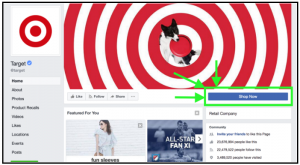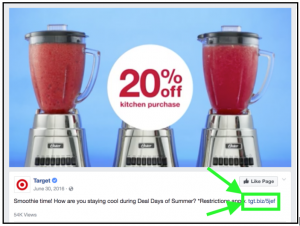Your best friend and you are hanging out, and you say, “Well, I have to get going; I have some errands I have to run.” Your friend says, “I’m bored; mind if I tag along?” In your mind, this is totally fine, because you are so close with your friend that you can do whatever menial tasks you have with that person without feeling the need to constantly entertainment him/her.
You arrive at Target and walk around. You need a bathing suit that you can wear to that party next week.
“Oh I know the perfect bathing suit for you. It’s just your style. Come over here,” your best friend says.
You follow him/her and he/she puts the bathing suit in your hands. You go and try it on, and boom–you have a new suit (that your friend was absolutely right about, by the way).
In today’s age of social media mania, purchasing things online works in just the same way, only companies benefit even more than in person word of mouth. Instead of your friend physically handing you a bathing suit, he/she might tag you in the Target’s status about the bathing suit he/she thinks you’ll like. They may even share it to your timeline on Facebook, for example, or send it to you via Facebook Messenger. The methods of sharing this status with you are vast. Social profiles like Facebook make sharing and purchasing incredibly easy, so much so that their design is set up in such a way that encourages buying from companies directly through Facebook.
Let’s use Target as an example.

Target has a “Shop Now” button, that if you click on it, it will bring you to Target’s homepage. But, Target does more than simply have a “Shop Now” button on their Facebook Page; they publish content constantly that points people back to shopping opportunities with them constantly.

This little URL in the above image brings you to Target’s “Hot Deals Daily” page, where one can find Target’s daily promotional items. You can also “Like” Target’s Facebook Page right on the social media post.
By clicking “Like” on that status, a customer is automatically enrolling their friends’ Newsfeeds in a display of this “Like.” It will say something like, “[Name] liked this status,” or, “[Name] commented on this status.” Because of this, Target is getting you to spread their products by word of mouth without even getting your explicit permission. Because you liked it, Facebook now gives Target the right to share that you liked them with your friends, building the ultimate trust needed with your friends to get them to purchase their products.
It’s truly genius that social media profiles provide this opportunity to potential customers.
Want to learn more about how eCommerce is impacting people on social media? Take a look at these two articles, “The Future of Social Commerce: Shopping On Twitter, Pinterest and Beyond,” and, “How Social Media Has Affected the eCommerce and Payment Industries.” Also, follow me on Twitter to see regular industry updates!
